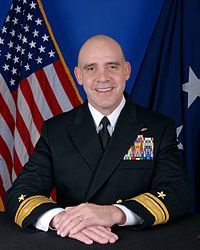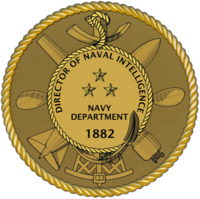- Office of Naval Intelligence
-
The Office of Naval Intelligence (ONI) was established in the United States Navy in 1882. ONI was established to "seek out and report" on the advancements in other nations' navies. Its headquarters are at the National Maritime Intelligence Center in Suitland, Maryland. ONI is the oldest member of the United States Intelligence Community, and is also therefore by default the senior intelligence agency within the armed forces, though subordinate to the Defense Intelligence Agency.
ONI was founded by the Secretary of the Navy, William H. Hunt with General Order 292, dated March 23, 1882, which read:
An “Office of Intelligence” is hereby established in the Bureau of Navigation for the purpose of collecting and recording such naval information as may be useful to the Department in time of war, as well as in peace.To facilitate this work, the Department Library will be combined with the “Office of Intelligence,” and placed under the direction of the Chief of the Bureau of Navigation.
Commanding and all other officers are directed to avail themselves of all opportunities which may arise to collect and to forward to the “Office of Intelligence” professional matters likely to serve the object in view.[1]ONI's position as the naval intelligence arm began in earnest when the United States declared war on Spain in 1898 in response to the sinking of the U.S. battleship Maine in the harbor of Spanish-controlled Havana, Cuba. ONI's powers grew as it became responsible for the "protection of Navy Personnel, censorship and the ferreting out of spies and saboteurs."
In 1929, the Chief of Naval Operations made these functions the permanent duties of ONI. During World War II, Naval Intelligence became responsible for the translation, evaluation and dissemination of intercepted Japanese communications, and its budget and staff grew significantly. While other parts of the Navy were downsized after the war, Fleet Admiral Nimitz ensured ONI's continued strength, which was to prove important during the Cold War.
Contents
United States Navy
Director of Naval Intelligence
Incumbent:
VADM Kendall L. Card
since: June 1, 2011First Theodorus B. M. Mason Formation June 1882 Website Official Website
- Note: Prior to 1911 the head of the ONI was known as the Chief Intelligence Officer.
- Lt. Theodorus B.M. Mason (June 1882 – April 1885)
- Lt. Raymond P. Rodgers (April 1885 – July 1889)
- Cmdr. Charles H. Davis, Jr. (September 1889 – August 1892)
- Cmdr. French E. Chadwick (September 1892 – June 1893)
- Lt. Frederick Singer (June 1893 – April 1896)
- Lt. Cmdr. Richard Wainwright (April 1896 – November 1897)
- Cmdr. Richardson Clover (November 1897 – May 1898)
- Capt. John R. Bartlett (May 1898 – October 1898)
- Cmdr. Richardson Clover (reappointed) (October 1898 – February 1900)
- Capt. Charles D. Sigsbee (February 1900 – April 1903)
- Cmdr. Seaton Schroeder (May 1903 – April 1906)
- Capt. Raymond P. Rodgers (reappointed) (April 1906 – May 1909)
- Capt. Charles E. Vreeland (May 1909 – December 1909)
- Capt. Templin M. Potts (December 1909 – January 1912)
- Capt. Thomas S. Rodgers (January 1912 – December 1913)
- Capt. Henry F. Bryan (December 1913 – January 1914)
- Capt. James H. Oliver (January 1914 – March 1917)
- Rear Adm. Roger Welles Jr. (April 1917 – January 1919)
- Rear Adm. Albert P. Niblack (May 1919 – September 1920)
- Rear Adm. Andrew T. Long (September 1920 – June 1921)
- Capt. Luke McNamee (September 1921 – November 1923)
- Rear Adm. Henry H. Hough (December 1923 – September 1925)
- Capt. William W. Galbraith (October 1925 – June 1926)
- Capt. Arthur J. Hepburn (July 1926 – September 1927)
- Capt. Alfred W. Johnson (December 1927 – June 1930)
- Capt. Harry A. Baldridge (June 1930 – May 1931
- Capt. Hayne Ellis (June 1931 – May 1934)
- Capt. William D. Puleston (June 1934 – April 1937)
- Rear Adm. Ralston S. Hughes (May 1937 – June 1939)
- Rear Adm. Walter S. Anderson (June 1939 – January 1941)
- Capt. Jules James (January 1941 – February 1941)
- Adm. Alan G. Kirk (March 1941 – October 1941)
- Rear Adm. Theodore S. Wilkinson (October 1941 – July 1942)
- Rear Adm. Harold C. Train (July 1942 – September 1943)
- Rear Adm. Roscoe E. Schuirmann September 1943 – October 1944)
- Rear Adm. Leo H. Thebaud (October 1944 – September 1945)
- Rear Adm. Thomas B. Inglis (September 1945 – September 1949)
- Rear Adm. Felix L. Johnson (September 1949 – June 1952)
- Rear Adm. Richard F. Stout (July 1952 – November 1952)
- Rear Adm. Carl F. Espe (December 1952 – May 1956)
- Rear Adm. Laurence H. Frost (June 1956 – September 1960)
- Rear Adm. Vernon L. Lowrance (September 1960 – June 1963)
- Rear Adm. Rufus L. Taylor (June 1963 – May 1966)
- Capt. Maurice H. Rindskopf (May 1966 – July 1966)
- Rear Adm. Eugene B. Fluckey (July 1966 – June 1968)
- Capt. Frank M. Murphy (June 1968 – August 1968)
- Rear Adm. Frederick J. Harlfinger II (August 1968 – July 1971)
- Vice Adm. Earl F. Rectanus (July 1971 – September 1974)
- Rear Adm. Bobby Ray Inman (September 1974 – July 1976)
- Rear Adm. Donald P. Harvey (July 1976 – August 1978)
- Rear Adm. Sumner Shapiro (August 1978 – August 1982)
- Rear Adm. John L. Butts (August 1982 – September 1985)
- Rear Adm. William O. Studeman (September 1985 – July 1988)
- Rear Adm. Thomas A. Brooks (July 1988 – August 1991)
- Rear Adm. Edward D. Sheafer, Jr. (August 1991 – September 1994)
- Rear Adm. Michael W. Cramer (September 1994 – May 1997)
- Mr. Paul Lowell (Acting) (May 1997 – November 1997)
- Rear Adm. Lowell E. Jacoby (November 1997 – June 1999)
- Rear Adm. Perry M. Ratliff (June 1999 – March 2000)
- Mr. Paul Lowell (March 2000 – August 2000)
- Rear Adm. Richard B. Porterfield (August 2000 – April 2005)
- Rear Adm. Robert B. Murrett (April 2005 – July 2006)
- Rear Adm. Tony L. Cothron (July 2006 – July 2008)
- Vice Adm. David J. Dorsett (July 2008 – June 2011)
- Vice Adm. Kendall L. Card (June 2011 - )
- Bernard M. Baruch Jr.
- Gordeaux Ewell
- Bobby Patrick
- Mark Kirk
- Edwin T. Layton
- Joseph Rochefort
- John Paul Stevens
- Byron White
- Bob Woodward
- Milton William Cooper (Was a Petty Officer with a Top-Secret Security Clearance. His time in ONI inspired him to write "Behold a Pale Horse".)
References
- Packard, Wyman H. (1996). Century of U.S. Naval Intelligence. Naval Historical Center. ISBN 0-945274-25-4.
 This article incorporates public domain material from the Naval History & Heritage Command document "General Order No. 292 (23 March 1882)".
This article incorporates public domain material from the Naval History & Heritage Command document "General Order No. 292 (23 March 1882)".- Portions of this article are based on public domain text from Office of Naval Intelligence.
- Portions of this article are based on public domain text from Digital National Security Archive.
External links
Leadership 

Structure Operating ForcesFleet Forces Command · Pacific Fleet · Naval Forces Europe · Naval Forces Central Command · Naval Forces Southern Command · Naval Special Warfare Command · Naval Reserve Forces · Operational Test and Evaluation Force · Naval Network Warfare Command · Military Sealift CommandShore EstablismentsNaval Sea Systems Command · Naval Air Systems Command · Naval Facilities Engineering Command · Naval Supply Systems Command · Space and Naval Warfare Systems Command · Naval Academy · Naval Education and Training Command · Naval Meteorology and Oceanography Command · Office of Naval Intelligence · Naval Strike and Air Warfare Center · Naval Security Group Command · Naval Legal Service Command · Naval Observatory · Naval Safety Center · Bureau of Naval Personnel · Bureau of Medicine and SurgeryNumbered fleetsStructureA–B · C · D–F · G–H · I–K · L · M · N–O · P · Q–R · S · T–V · W–Z
Aircraft carriers · Airships · Amphibious warfare ships · Auxiliaries · Battleships · Cruisers · Destroyers · Destroyer escorts · Escort carriers · Frigates · Mine warfare vessels · Monitors · Patrol vessels · Sailing frigates · Steam frigates · Steam gunboats · Ships of the line · Sloops of war · Submarines · Torpedo boatsPersonnel and training People · Officers: Officer insignia / Designators · Enlisted: Enlisted insignia / Ratings / Classification
Hospital Corpsman · Naval Aviator · SEALs · Seabees · SWCCs · Hispanic sailors
Personnel: Chaplain Corps (Chief of Chaplains) · United States Navy EOD · Medical Corps · Dental Corps · Nurse Corps · Medical Service Corps · Supply Corps · Civil Engineer Corps · JAG Corps (JAG) · NCIS · Boatswain's mates
Training: Recruit training · United States Naval Academy · Officer Candidate School · STA-21 · NROTC · BESS · BFTT · CNATT · COMPTUEX · NAWCTSD · Naval Chaplaincy School · Naval Hospital Corps School · Naval Justice School · Naval Postgraduate School · Navy School of Music · Navy Senior Enlisted Academy · Navy Supply Corps School · Naval War College · Nuclear Power School · JMTC · TOPGUN · USNTPS · Uniformed Services University of the Health SciencesEquipment History and traditions History · "Anchors Aweigh" · Blue Angels · Continental Navy · Ensign · Fleet bands · Fleet Week · Jack · Line-crossing ceremony · National Museum · Navy Band · Navy Flag · Navy Hymn · Navy Memorial · Navy service numbers · Sailor's Creed · Ship commissioning · Ship decommissioning · USS Constitution · Wetting-downCategories:- United States Navy organization
- United States intelligence agencies
- Military units and formations established in 1882
Wikimedia Foundation. 2010.


